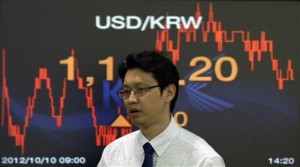
A currency trader walks by near a screen showing foreign exchange rate at the foreign exchange dealing room of the Korea Exchange Bank headquarters in Seoul, South Korea, on Oct. 10, 2012. Asian markets and the euro fell on Thursday as a Standard & Poor’s downgrade of Spain’s credit rating overshadowed an upbeat assessment of the US economy by the Federal Reserve. AP Photo/Lee Jin-man)
HONG KONG—Asian markets and the euro fell on Thursday as a Standard & Poor’s downgrade of Spain’s credit rating overshadowed an upbeat assessment of the US economy by the Federal Reserve.
Traders were also following a lead from Wall Street and European investors in the wake of the IMF’s decision to slash its global growth forecasts, while concerns over the upcoming corporate earnings season also weighed on sentiment.
Eyes were also on a meeting which started later in the day of the finance ministers of the Group of Seven leading industrialized nations, which will take place in Tokyo.
Tokyo slipped 0.58 percent, or 49.45 points, to 8,546.78, with the territorial spat between Japan and China continuing to sit heavily on confidence.
Sydney fell 0.16 percent, or 7.2 points, to 4,483.5 and Seoul lost 0.78 percent, or 15.13 points, to 1,933.09.
Shanghai finished down 0.81 percent, or 17.07 points, to 2,102.87 but Hong Kong bucked the regional trend, rising 0.38 percent, or 79.45 points, to 20,999.05.
Standard & Poor’s said late Wednesday it had cut Spain’s sovereign debt rating by two notches to just above junk level, citing the deepening recession and strains from the country’s troubled banks.
“The downgrade reflects our view of mounting risks to Spain’s public finances, due to rising economic and political pressures,” the ratings agency said.
“The deepening economic recession is limiting the Spanish government’s policy options,” it said, adding that joblessness at 25 percent and tighter spending will likely intensify social conflict and tensions in the country.
The news is the latest to stoke eurozone concerns as Madrid refuses to ask for an international bailout, which would in turn kickstart a European Central Bank bond-buying program that would lower the country’s borrowing costs.
S&P’s move hit the euro, which fell to $1.2869 and 100.46 yen in afternoon Asian trade from $1.2887 and 100.74 yen in New York late Wednesday.
And the dollar slipped to 78.07 yen from 78.18 yen.
The dollar got a little support from the US central bank’s latest outlook on the world’s No. 1 economy.
In its Beige Book report, the Fed said that economic activity “generally expanded modestly” since the last report six weeks earlier, when it characterized growth as only gradual.
However, Wall Street was unimpressed. The Dow fell 0.95 percent, the S&P 500 dropped 0.62 percent and the Nasdaq gave up 0.43 percent.
Also sapping confidence are worries over the upcoming earnings season, with most market-watchers expecting a poor batch of results reflecting a slowdown in the global economy.
Adding to these fears Wednesday were comments from US aluminium giant Alcoa, which said it had cut its growth forecasts because of the slowdown in China.
G7 finance ministers began a meeting to discuss the plodding global economy as well as the yen’s ongoing strength, which is hammering Japan’s economy.
The gathering comes as the International Monetary Fund and World Bank prepare to hold their annual meetings. Earlier this week the IMF slashed its global growth estimates for this year and next, citing the eurozone crisis, a weak US recovery and a slowdown in China.
On oil markets New York’s main contract, light sweet crude for delivery in November, advanced 70 cents to $91.95 a barrel in the afternoon and Brent North Sea crude for November delivery gained 79 cents to $115.12.
Gold was at $1,770.18 at 1050 GMT compared with $1,763.55 late on Wednesday.
In other markets:
— Taipei fell 1.85 percent, or 140.29 points, to 7,451.72.
Hon Hai Precision fell 3.7 percent to Tw$86.0 while TSMC shed 1.84 percent to Tw$85.5.
— Wellington slipped 0.12 percent, or 4.84 points, to 3,883.30.
Telecom fell 0.21 percent to NZ$2.33, Fletcher Building added 1.1 percent to NZ$7.24 and Fisher & Paykel Appliances was flat at NZ$1.23.
— Manila slid 0.30 percent, or 16.13 points, to 5,353.47.
Philippine Long Distance Telephone fell 0.95 percent to 2,698 pesos while shopping center developer SM Investments dropped 1.70 percent to 780 pesos.
— Singapore closed down 0.04 percent, or 1.15 points, to 3,032.66.
Singapore Airlines shed 0.57 percent to Sg$10.52 and Singapore Telecommunications fell 1.26 percent to Sg$3.14.
— Jakarta closed up 0.12 percent, or 4.95 points, at 4,284.96.
Indocement rose 0.48 percent to 20,850 rupiah, Gudang Garam added 0.48 percent to 51,850 rupiah, while Aneka Tambang lost 0.78 percent to 1,280 rupiah.
— Kuala Lumpur fell 0.24 percent, or 3.93 points, to close at 1,655.47.
Tenaga Nasional lost 0.1 percent to 6.99 ringgit, while Axiata Group fell 1.9 percent to 6.58. Telekom Malaysia inched up 0.3 percent to 6.29 ringgit.
— Bangkok edged up 0.43 percent, or 5.55 points, to 1,294.90.
Coal producer Banpu dropped 0.75 percent to 395 baht, while Siam Cement added 1.98 percent to 360 baht.
— Mumbai rose 0.93 percent, or 173.65 points, to 18,804.75.
Infosys gained 1.09 percent to 2,531.49 rupees while real-estate firm Unitech jumped 17.49 percent to 27.2 rupees.